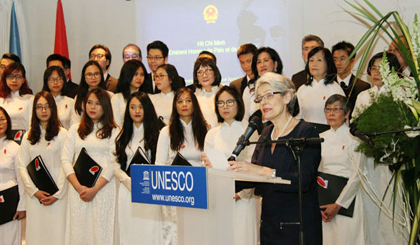Paris exhibition honours late President Ho Chi Minh
An exhibition dedicated to late President Ho Chi Minh opened in Paris, France on the evening of November 13 to mark the 30th anniversary of UNESCO’s Resolution 24C/18.65 in 1987, urging UNESCO member states to join in the commemoration of the centenary of the birth of the president (1890-1990).
 |
| UNESCO Director-General Irina Bokova speaks at the event. (Credit: NDO) |
The event was co-hosted by the Vietnamese Permanent Delegation to UNESCO and the Vietnamese Embassy in France.
In her opening speech, Tran Thi Hoang Mai, Ambassador and Head of the Vietnamese Permanent Delegation to UNESCO, affirmed that Resolution 18.65, adopted by the 24th General Conference of UNESCO in 1987, recognised that President Ho Chi Minh devoted all his life to the struggle for national liberation of the Vietnamese people, contributing to the common struggle of peoples for peace, national independence, democracy and social progress.
Ambassador Mai said President Ho Chi Minh is the national liberation hero and an outstanding symbol of cultural excellence. He left for the Vietnamese people an invaluable heritage, which is Ho Chi Minh Thought, not only about the Vietnamese revolutionary ideals, but also the vitally important role of education and culture for peace and development.
His writings, poems, essays and speeches reflect a deep understanding of human history and civilisation, as well as the belief in the power of cultures in the world of each person and every nation. These are also major goals pursued by UNESCO, the diplomat stated.
UNESCO Director-General Irina Bokova expressed her deep affection for the country and people of Vietnam, especially the respect for President Ho Chi Minh, through her three visits to Vietnam.
According to the UNESCO official, President Ho Chi Minh was a humanist and intellectual – a poet, a journalist, and a teacher, keenly aware of the power of education for national self-determination as well as for individual empowerment.
(Source: NDO)
 về đầu trang
về đầu trang







